CMPS 2433 Chapter 2 – Part 2 Functions & Relations
advertisement
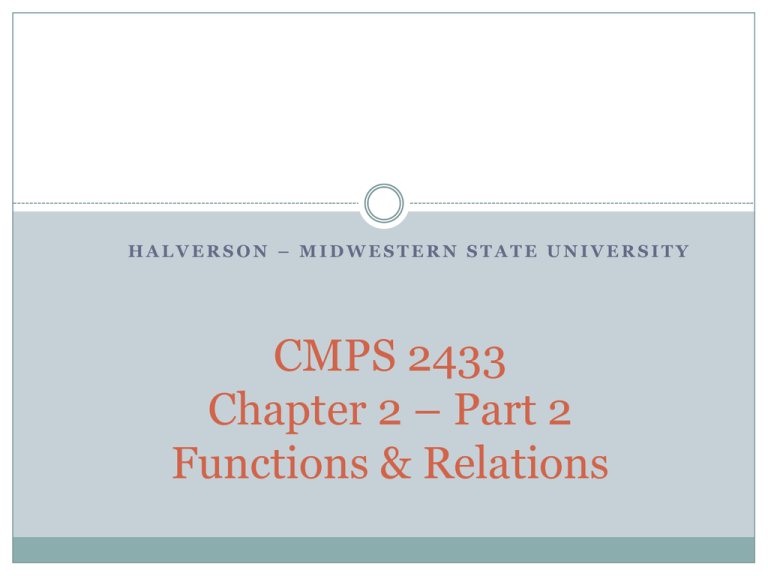
HALVERSON – MIDWESTERN STATE UNIVERSITY
CMPS 2433
Chapter 2 – Part 2
Functions & Relations
2.2 Relations
A RELATION from set A to set B is any
subset of the Cartesian Product A X B
If R is a relation from A to B & (a, b) is an
element of R, a is related to b by R
Example
A
= {students enrolled at MSU in fall 2014}
B = {courses offered at MSU in fall 2014}
R = {(a,b)| student a is enrolled in course b}
R = {(Smith,Math1233), (Jones, CMPS1044), etc.}
Relations (cont’d)
A relation is ANY subset, so no repeated pairs
but can have repeated elements in the pairs.
R = {(Smith,Math1233), (Jones, Cmps1044),
(Smith, Engl1013), (Jones, Math1233),
(Hunt, Math1233), (Williams, Cmps1044), etc.}
What is the Universal Set for R?
Define a different Relation from A to B.
Relations (cont’d)
Example: R is a relation on A
A = {students enrolled at MSU in fall 2014}
R = {(a, b)| a & b are in a course together}
R = {(Smith, Jones), (Jones, Hunt), (Hunt, Wills),
(Wills, Johnson), etc.}
What about (Jones, Smith)?
Relation from a set S to itself is call a Relation on S
Reflexive Property of Relations
A Relation R on a set S is said to be Reflexive
if for each x S, x R x is true
if for each x S, (x, x) is in R
that is, every element is related to itself
Is our previous example R a Reflexive
Relation?
Reflexive Property of Relations - Examples
A = {students enrolled at MSU in fall 2014}
Which of the following are Reflexive?
R = {(a,b): a & b are siblings}
R = {(a,b): a & b are not in a course together}
R = {(a,b): a & b are same classification}
R = {(a,b): a & b are married}
R = {(a,b): a & b are the same age}
R = {(a,b): a has a higher GPA than b}
Symmetric Property of Relations
A Relation R on a set S is said to be
Symmetric
If
x R y is true, then y R x is true
If (x, y) R, then (y, x) is true
That is, the elements of the relation R can be
reversed
Is R Symmetric?
R = {(a, b)| a & b are in a course together}
Symmetric Property of Relations - Examples
A = {students enrolled at MSU in fall 2014}
Which of the following are Symmetric?
R = {(a,b): a & b are siblings}
R = {(a,b): a & b are not in a course together}
R = {(a,b): a & b are same classification}
R = {(a,b): a & b are married}
R = {(a,b): a & b are the same age}
R = {(a,b): a has a higher GPA than b}
Transitive Property of Relations
A Relation R on a set S is said to be
Transitive
If
x R y and y R z are true, then x R z is true
If (x, y) R & (y, z) R, then (x, z) R
Is R Transitive?
R = {(a, b)| a & b are in a course together}
Transitive Property of Relations - Examples
A = {students enrolled at MSU in fall 2014}
Which of the following are Transitive?
R = {(a,b): a & b are siblings}
R = {(a,b): a & b are not in a course together}
R = {(a,b): a & b are same classification}
R = {(a,b): a & b are married}
R = {(a,b): a & b are the same age}
R = {(a,b): a has a higher GPA than b}
Equivalence Relation
Any Relation that is Reflexive, Symmetric &
Transitive is an Equivalence Relation
If R is an Equivalence Relation on S & x S,
the set of all elements related to x is called
an Equivalence Class
Denoted
[x]
Any 2 Equivalence Classes of a Relation are
either Equal or Disjoint
The
Equivalence Classes of R Partition S
Equivalence Relations - Examples
A = {students enrolled at MSU in fall 2014}
Which are Equivalence Relations?
If so, what are the partitions?
R = {(a,b): a & b are siblings}
R = {(a,b): a & b are not in a course together}
R = {(a,b): a & b are same classification}
R = {(a,b): a & b are married}
R = {(a,b): a & b are the same age}
R = {(a,b): a has a higher GPA than b}
Homework on Relations - Section 2.2
Page 52 – 54
Problems 1 – 14, 19-20, 25
Section 2.4 - Functions
A Function f from set X to set Y is a
relation from X to Y in which for each
element x in X there is exactly one
element y in Y for which x f y
Among the ordered pairs (x, y) in f, x
appears only ONCE
Example: is F a function?
F = {(2,3), (3,2), (4,2)}
F = {(2,3), (3,2), (2,4), (4,6)}
Mathematical Functions
Consider mathematical FUNCTIONS
Assume S = {0, 1, 2, 3, 4, 5,…}
f(x) = x2 = {(0,0), (1,1),(2,4),(3,9),(4,16),…}
f(x) = x+2 = {(0,2),(1,3),(2,4),(3,5),…}
For every x, there is only ONE value to which
it is related, thus these are Functions!
Equivalence Relations - Examples
A = {students enrolled at MSU in fall 2014}
Which are Functions?
R = {(a,b): a & b are siblings}
R = {(a,b): a & b are not in a course together}
R = {(a,b): a & b are same classification}
R = {(a,b): a & b are married}
R = {(a,b): a & b are the same age}
R = {(a,b): a has a higher GPA than b}
Function Domain
If f is a function from X to Y, denote f: X Y
Set X is called the domain of the function
Set Y is called co-domain
Subset of Y actually paired with elements of
X under f is called the range
For f(x) = y, y is the image of x under f
Domain, Co-domain, Range Examples
S = {…, -3,-2,-1,0, 1, 2, 3, 4, 5,…}
Define f as a function on S
F(x) = x2
Domain = S
Co-domain = S
Range = ???
Functions – additional terms
One-to-One function
For
every x, there is a unique y &
For every y, there is a unique x
{(x, y)| no repeats of x or y}
S = {…, -3,-2,-1,0, 1, 2, 3, 4, 5,…}
f(x) = x2
Is f one-to-one?
Exponential & Logarithmic Functions
Logarithmic functions IMPT in Computing
Generally, base 2
NOTE:
2n
is exponential function, base 2
20 = 1 and 2-n = 1/2n
See page 73 for graph – Figure 2.18
Logarithmic Function base 2 is inverse of
Exponential Function
Logarithmic Function - Base 2
Notation: log2 x
Read
“log base 2 of x”
Defn: y = log2 x if and only if x = 2y
Examples:
log2
8 = 3 because 23 = 8
log2 1024 = 10 because 210 = 1024
log2 256 = 8 because 28 = 256
log2 100 ~~ 6.65 because 26.65 ~~ 100
More on Logarithmic Function - Base 2
Growth rate is small, less than linear
See graph page 74 – Figure 2.19
Calculator Note:
Most
calculators with LOG button is base 10
log 2 x = LOG x / LOG 2
Algorithms with O(log2 n) complexity??
Homework – Section 2.4
Note – we omitted section on Composite &
Inverse Functions
Page 74-75
Problems 1 - 36
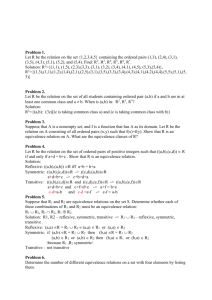
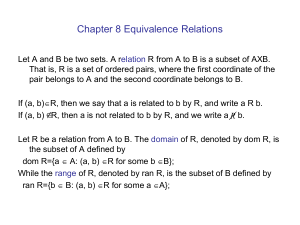
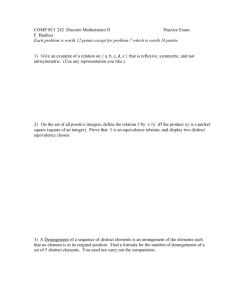
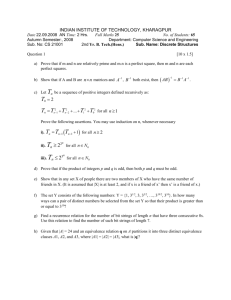
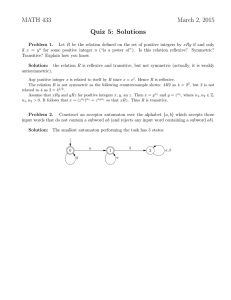
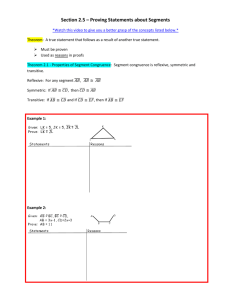
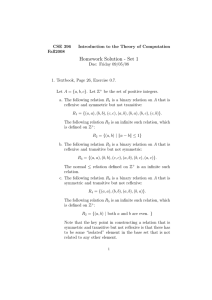
![MA1124 Assignment3 [due Monday 2 February, 2015]](http://s2.studylib.net/store/data/010730345_1-77978f6f6a108f3caa941354ea8099bb-300x300.png)